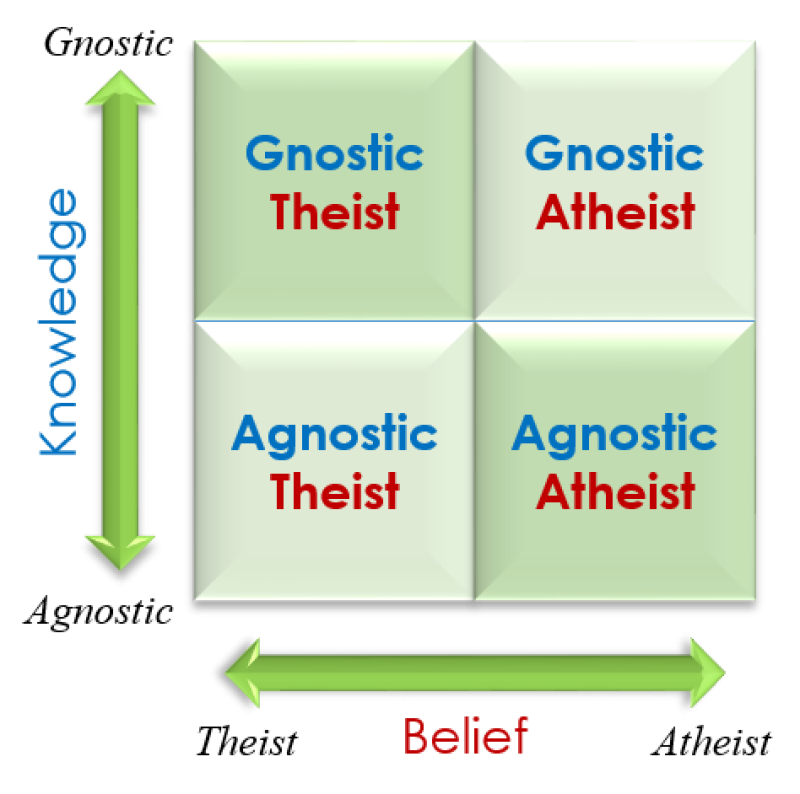Presuming Certainty
Theological discussions often turn ugly. A major contributing factor is our terminology. Theists seem to equate ' atheist ' with ' evil ' while atheists liken ' theist ' with ' mindless follower '.
We routinely use the terms atheist, agnostic and theist yet it is not clear they mean what we think they mean .
Everyone is either a theist or an atheist in terms of belief in a deity (supreme being). A theist believes in one or more deities whereas an atheist believes in none.†
Certainty of Knowledge
What about agnostic? The word agnostic refers to a measure of certainty of knowledge . Much like atheist counters theist in belief , agnostic counters gnostic in knowledge . Agnosticism has crept into descriptions of belief because most people realize that certainty is not supportable – one could be wrong. Agnostics recognize they could be wrong about a deity whereas gnostics insist they have found truth. This is a huge difference in position.
Combining belief with knowledge yields four positions regarding belief in deities:
- Gnostic Theist — 100% certain their deity(ies) exist; no other possibilities
- Agnostic Theist — believes in at least one deity yet acknowledges may be mistaken
- Agnostic Atheist — no belief in a deity but open to persuasive evidence to the contrary
- Gnostic Atheist — 100% certain no deity exists; no other possibilities
Having established the ( well known ) terms ...
Why Does This Matter?
It matters in discussions between atheists and theists.
Most everyone, I submit, is agnostic - either an agnostic theist or an agnostic atheist. This is a rational position given nobody can absolutely know if a deity exists or not at this point. In contrast, gnostic positions are usually untenable‡ and easy to dismiss.
During discussion (or debate), many presume ' atheist ' to mean ' gnostic atheist ' when in reality most every atheist is an ' agnostic atheist '. When the atheist stipulates: ' I am not convinced a deity exists ' the theist often presumes certainty : ' there is no deity '. Even outspoken activist atheist Richard Dawkins acknowledges that he is an agnostic atheist . If provided with persuasive evidence I am confident even the most ardent atheists such as Dawkins would be theists, and with no regrets.
Similarly, atheists tend to presume every theist is a gnostic theist - an individual who would under no circumstances question their belief (e.g. Ken Ham). There is a huge difference between strong belief and irrational certainty such as with Ham. While there are quite a few gnostic theists I suggest most everyday believers within Judeo-Christian religions privately acknowledge the possibility that their deity does not exist.
In short, people can hold strong positions without necessarily being irrational. Yet discussions / debates often presume the most extreme positions - gnostic atheism and gnostic theism. If you are arguing with ' the other side ' check to see if they are claiming certainty. If not, you may be debating a fellow agnostic who leans one way while you lean the other. Do not presume certainty - there is likely more common ground than you might imagine.
.________.
† Those who claim to not know if they believe in a deity do not, by definition, have a belief and are atheist.
‡ Note that these positions arguably depend upon specific deities. A pantheist for example equates all of existence with 'god', the gnostic position here is supported by definition. A gnostic atheist position that no deities exist is impossible to prove. A gnostic theist position of a specific deity with a self-refuting characteristic such as omniscience is untenable by logic.



